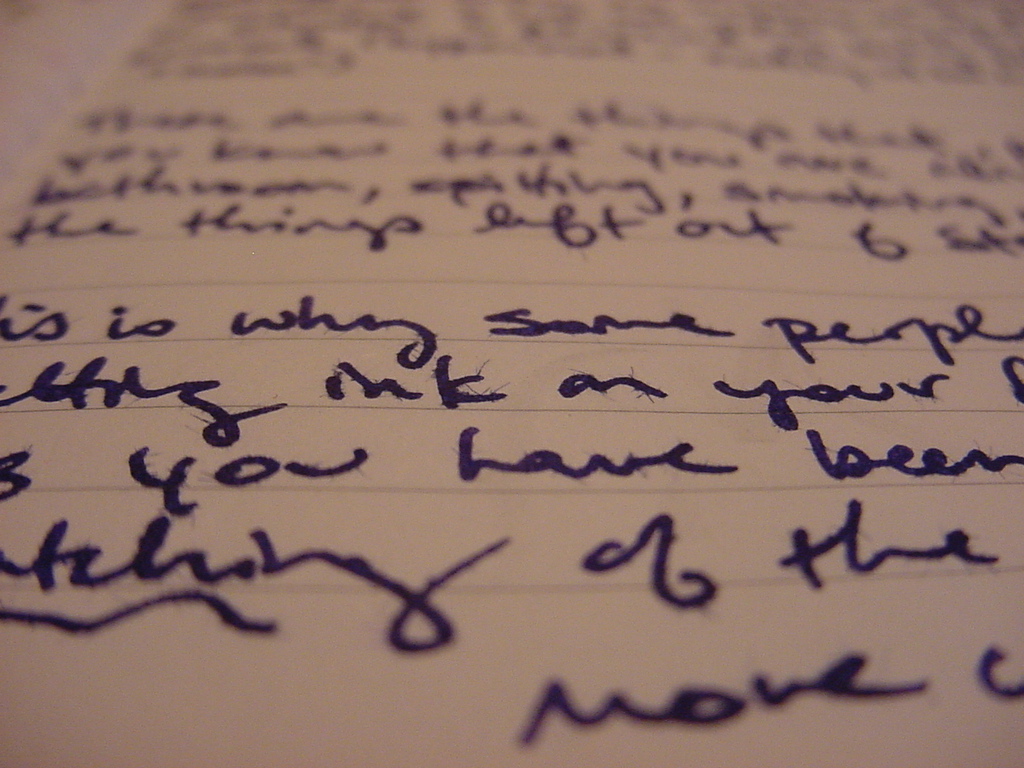Letters to Self
Jill Reid
 At some point each semester, I talk to my writing class about the importance of keeping a journal.So much of what writers produce must be attached to deadline or assignment. Under these conditions, we check our tone, weigh risks, and write beneath the shadow of an imagined and rolling eye. Under that kind of constraint, it’s important to have a place where our voices can crack with the terror or silliness or strain of the immediate moment without the pressure of public presentation.
At some point each semester, I talk to my writing class about the importance of keeping a journal.So much of what writers produce must be attached to deadline or assignment. Under these conditions, we check our tone, weigh risks, and write beneath the shadow of an imagined and rolling eye. Under that kind of constraint, it’s important to have a place where our voices can crack with the terror or silliness or strain of the immediate moment without the pressure of public presentation.
So, I press fresh paperback journals into young hands and quote Flannery O’Connor famous words, “I don’t know what I think until I read what I say.” I tell them to write without burden because keeping a journal will make a space for discovery that even the most exacting assignment might not produce.And while I fully believe the possibility of this sort of discovery is real and true, I almost forget to expect that sort of discovery for myself.
In a letter to college freshman, Alfred Corn (now a famous poet), Flannery O’Connor addresses Corn’s concern for new and intense doubts about his Christian faith. As any reader of O’Connor would expect, her responses are profound and thoughtful. Assuring him that real faith must encounter real doubt, she reminds him that “doubt is an experience that belongs to faith.” Using her method of letter writing as a catalyst for a free-write, I direct students to “write a letter to your past self that suggests experiences of doubt and faith without using either of the words doubt or faith.” And when I go home and search my own shelves for an old journal, I am surprised to discover that I have been writing these kinds of letters to myself for a long time.
For a fevered hour, I sit with my own journals, the stiff-spined and the scraggly paged, cheap composition books and mahogany moleskines. I read and reread and find that beyond the images and ideas I left for myself to develop into poems and papers, I have also been writing very personally to my own self. I stare a long time at four sentences that lament the doubt a past self felt about my capacity to “really” write, and I begin to remember, flanked by my own words, that the doubt I experience today in my writing life is nothing new. Suddenly, I wanted to hug the author who admitted this struggle, to high-five her, embracing “yesterday’s” voice with an abandon I would never direct at “today’s”. The experience of having my own past voice directly address my present one was like encountering an inheritance someone else had earned and carefully saved for the benefit of another generation. Yesterday’s voice admitted angst that today’s voice still understood. There was such relief in that mutual understanding.
A letter, in its nature of direct and intimate address, clasps my imagination in the same way my grandmother’s old hands cup the face of my daughter. There is something about a voice that belongs to a moment I intimately know; I can believe in that voice because I can believe in the reality of the moment from which it speaks. How shocking, for the writer, so used to falling in love with other voices, other stories, to find her own voice worth listening to.
Metaphysical poet, John Donne, writes that “More than kisses, letters mingle souls.” While the act of writing letters naturally lends itself to the passionate longing of lovers, I am moved by the letters that I have, even unknowingly, been writing to myself. I am breathless for notes scrabbled in margins and smudged blue into spidery paragraphs. How vital our own voices can become, shimmering in margins of shelved journals, waiting to reach across time and distance like a letter addressing us in a moment we most need to hear from a friend.